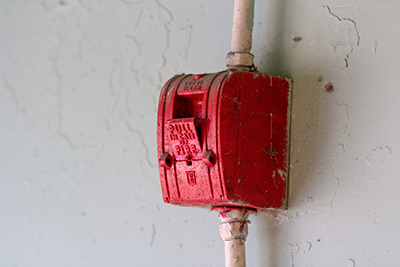Yes, You Heard Correctly!
 One way to think about anxiety is to compare it to a fire alarm. We all need this alarm to keep us safe and help us anticipate danger, so we never want to get rid of it for good. But, the question remains: What do we do when our “anxiety alarm” won’t shut off?
One way to think about anxiety is to compare it to a fire alarm. We all need this alarm to keep us safe and help us anticipate danger, so we never want to get rid of it for good. But, the question remains: What do we do when our “anxiety alarm” won’t shut off?
Excessive anxiety can be disruptive to our lives and our well-being, but there are solutions. Brittany Vetter, Licensed Clinical Social Worker with YMCA Youth and Family Services, says “you’d be surprised how small changes in the way you think can have a big impact on managing anxiety.” Brittany oversees the department’s Community Counseling Center, where trained clinicians can guide you on a path to recovery for troubling anxiety.
HERE ARE SOME WAYS YOU CAN START AT HOME:
Prove yourself wrong.
Most of the time our feelings are triggered by conscious or unconscious thoughts. These thoughts can either frustrate the anxiety or help calm it. Ask yourself: is this thought helpful in calming anxiety? If it is not helpful, how can you change it?
For example:
Unhelpful thought: “Julie is avoiding my calls because she is hiding something”
More helpful thought: “Julie started a new job and she is probably busy”
By pausing to reflect on your thoughts, you'll find that you have the power to flip the script on the stories you tell yourself.
For social or fear-based anxieties, it can be helpful to walk yourself all the way down the path of the “bad thing happening.”
When our anxiety alarm repeatedly goes off on the same topic, we have to let our brain see it through. While the thoughts may be scary or intense, it can be helpful to think the whole situation through to the very end (to even the bad thing happening) and repeat it over and over. Our brain will eventually become less sensitive to that thought, and it won’t react with the same intensity in the future. Think about a time you’ve had to tell a hard story. The first time you tell it is the hardest, but by the tenth time, it isn’t as hard, right?
Maintain your physical health.
Physical fitness plays a large role in mental health. It’s important to take the time to exercise, plan for healthy balanced meals, and get the right amount of sleep for your age and body type. Check out our Virtual YMCA for some healthy activities and recommendations.
Keep track of your thoughts.
If you have a therapist, keeping track of some examples to share with them will be helpful in healing from anxiety. Track where you were and what you were doing, what your feelings were (sad, scared, angry), and your automatic thoughts associated with the event.
If you are looking to get started with therapy or counseling, here is a useful guide we created: Where To Begin?: Six Things To Consider Before Starting Counseling.
Interested in other Mental Health Services?
Our clinical teams have extensive experience providing mental health services and online counseling to individuals, couples, families, children, and teens, covering a wide variety of topics. Learn more about our behavioral and mental health services.
Authors
Brittany Vetter, LCSW 81890, oversees Counseling Services for YMCA Youth & Family Services. She has over ten years of experience working in the mental health field in a variety of settings and is passionate about increasing wellness in San Diego.
Katie Demmler, LCSW 27751, oversees the Behavioral Health & Family Support Department for YMCA Youth & Family Services. Experienced with both mental health and social service programs, her primary goal is to help those in need overcome social, emotional, and behavior problems.
For more information about other services available, visit our website at www.ymcsd.org.


